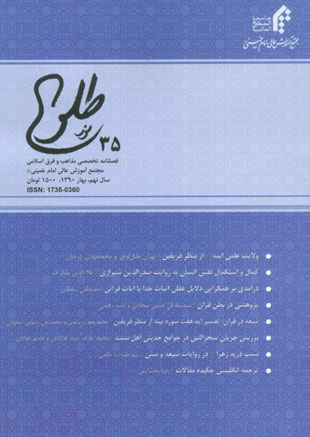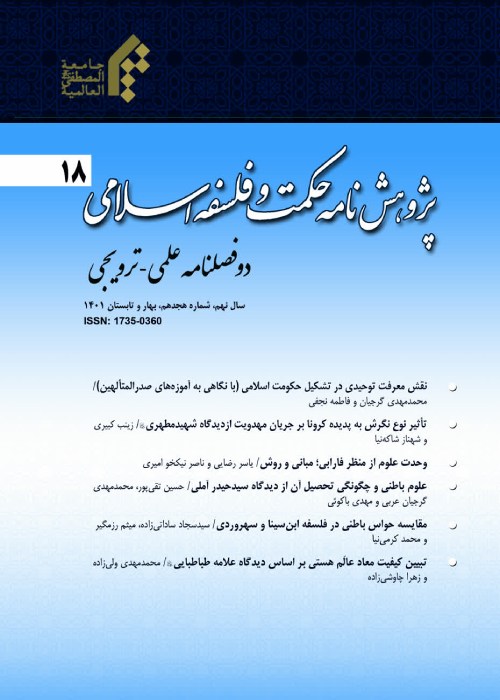فهرست مطالب

پژوهشنامه حکمت و فلسفه اسلامی
سال نهم شماره 35 (بهار 1390)
- 160 صفحه، بهای روی جلد: 15,000ريال
- تاریخ انتشار: 1390/05/15
- تعداد عناوین: 7
-
صفحه 5نوشته حاضر پیرامون ولایت ائمه اطهار (ع) در موضوعی بحث می کند که مورد توافق اکثریت فرق اسلامی است. ولایت ائمه (ع) در ساحت علم و فهم دین بر همگان روشن است. همین ویژگی باعث شده است که تطبیق بین فریقین در قالب همیشگی آن صورت نگیرد، بلکه به مقدمات مورد توافق فریقین بدون اصرار بر جدا کردن سرفصلها و منابع پرداخته شده، سپس لوازم و نتایج آن استخراج شده است.
رویکرد تقریبی در نوشته حاضر بدین صورت اعمال شده است که بر نقاط مشترک اسلامی بیشتر تمرکز شده است و نهایتا نتیجه نیز تابع همین رویکرد است؛ با این ملاحظه که فضایی پیش روی امت اسلامی گشوده شده است که پیروی از آن، موجب ارتقای فرهنگ اسلامی خواهد شد و آن التزام علمی و عملی به ولایت علمی ائمه اطهار (ع) است.
کلیدواژگان: ولایت علمی، امام، فهم قرآن، تاویل -
صفحه 23بحث این مقاله پیرامون «انسان کامل» از دیدگاه صدرالمتالهین است. فلسفه ملاصدرا یا حکمت متعالیه ترکیبی موزون از اندیشه های کلامی، فلسفی، عرفانی گذشتگان همراه با ابداعات و ابتکارات فکری خود وی است.
ایشان اندیشه های عقلی را با آیات قرآنی و احادیث اسلامی درآمیخته است و از آن مجموعه ای موزون به وجود آورده است. در حکمت متعالیه، عقل با نقل، برهان با قرآن نه تنها متضاد نیستند، بلکه مؤید و مکمل یکدیگرند.
در این مقاله، کمال و استکمال نفس انسان و خاصه انسان کامل را از دیدگاه ملاصدرا بررسی نموده ایم. وی بر اساس قواعدی چون اصالت وجود، حرکت جوهری و... توانسته مسئله نفس را از مرحله ای به مرحله ای دیگر ببرد.
کلیدواژگان: انسان کامل، مراتب کمال، نفس، عقل، ولایت، ملاصدرا -
صفحه 47بحث خداشناسی و ادله اثبات او از بدو حیات بشری قرین انسان بوده است و انسانها از راه های مختلف تجربی، عقلی و شهودی به این بحث می پرداخته اند. قرآن مجید نیز به سه روش فوق ارج نهاده است. پژوهش پیش رو در مقام آن است تا ادله «قرآن نهادی» را که در این کتاب الهی به آنها اشاره شده، مثل برهان نظم، حرکت، حدوث، وجوب و امکان، علت و معلول و فطرت را با اشاره مختصر، بدون تبیین و تفسیر، ارائه نماید. این قلم ضمن اشاره مختصری به برهانهای کلامی و فلسفی مذکور، به آیاتی که این براهین ریشه در نهاد آنها دارند، اشاره می کند. و در نهایت به این نتیجه رهنمون می شود که ادله ای که متکلمان و حکما در مبداء شناسی ارائه داده اند، ریشه و بنیان در کلام الهی دارد.
کلیدواژگان: خداشناسی، برهان نظم، برهان حرکت، برهان حدوث، برهان فطرت، آیات قرآن -
صفحه 65در این مقاله که به «بررسی اثبات بعد بطنی قرآن از منظر فریقین» اختصاص دارد، پس از بیان تعاریف برخی واژگان مربوط به تبیین ماهیت بطن، برای اثبات «بطن قرآن» روایاتی از فریقین، ذکر شده است. نویسنده سپس به جمع آوری نظریات و اقوال دانشمندان قرآنی، از شیعه واهل سنت، پرداخته و نظریات آنها را نقد و بررسی کرده است. همچنین امکان فهم بطن قرآن را برای غیر معصومان (ع) بررسی کرده، و برای غیر معصومان (ع) با شرایط خاص خود، به طور جزئی اثبات نموده است.
کلیدواژگان: بطن، تاویل، فریقین، شیعه، اهل سنت -
شیعه در قرآن / تفسیر آیه هفت سوره بینه از منظر فریقینصفحه 85خیر و شر دو جریانی است که، مستمرا درمقابل یکدیگر بوده و هست. در طول تاریخ طرفداران حق، نماد و سنبل خیرالبریه و طرفداران غیرحق، نماد شیطنت و شرالبریه شناخته می شود. در آیه هفت (7) سوره مبارکه بینه، از همین دو جریان فکری (خیرالبریه، شرالبریه) سخن به میان آمده است. دراین مقاله سعی بر این است تا ازمنابع و اسناد قابل پذیرش و معتبر فریقین مصداق واقعی این دوجریان تاریخی را بدست آوریم. روایات متعدد فریقین، تنها مصداق خیرالبریه را حضرت امیرمؤمنان علی بن ابی طالب (علیه السلام) و شیعیان وی معرفی نموده است. این روایات به خاطر کثرت طرق (که برخی بیش از چهل طریق نقل نموده اند)، از اعتبار بسیار زیاد و فوق العاده برخوردارند. با بررسی دقیق روایات شان نزول آیه، می توان گفت این آیه، سند گویا و ماندگاری برای شناخت جریان فکری خیرالبریه درطول زمان است.کلیدواژگان: خیرالبریه، قرآن، شیعه، اهل سنت
-
صفحه 111طبق عقاید اسلامی پیامبر(ص) باید برای رساندن شریعت الهی و اداره جامعه اسلامی از هرگونه اشتباه و سهو و نسیان در امان باشد، تا گفتارها و دستورهای وی برای مردم از هر جهت حجت و مورد اطمینان باشد. قرآن کریم نیز این مطلب را با عبارت«و ما ینطق عن الهوی ان هو الا وحی یوحی» (نجم:3و4) تایید نموده است. ولی احادیث سحر النبی پیامبر(ص) علاوه بر اینکه با عصمت پیامبر سازگاری ندارد، حضرت را در معرض سهو و نسیان معرفی می کند و از جهات مختلف شبهات و سؤالاتی (به وجود می آورد که نیاز به فحص و بررسی دارد. مثلا: آیامسحور شدن پیامبر(ص) با عصمت سازگاری دارد؟ آیا در حالت سحر امور رسالت محفوظ بوده است؟ آیا پیامبری که دچار سحر دشمنان می شود گفته هایش معتبراست؟ در این مقاله، علاوه بر بررسی محتوایی و رجالی این جریان، نظرات دانشمندان اهل سنت نیز بررسی می شود.
کلیدواژگان: پیامبر، سحر، سحرالنبی، اهل سنت، جامعه المصطفی العالمیه -
صفحه 131وکالت عقدی است که به موجب آن یکی از طرفین (موکل) طرف دیگر (وکیل) را نایب برای تصرف در زمان حیات خود در برخی از امور قرار می دهد. مذهب امامیه و مذاهب اربعه در استعمال وکالت به صورت خاص (به معنای وکالت در دعاوی) اتفاق نظر دارند، اما وکالت به صورت عام را امامیه در جمیع عقود و مذاهب اربعه در بیع و شراء، جاری می دانند. فقهای فریقین بر مشروعیت وکالت اتفاق نظر دارند وبه آیات وروایتی در این زمینه تمسک جسته اند. هر کدام از فرقه ها در مواردی استثنا قائل شده و وکالت را بلاعزل می دانند. شرایط وکیل از جمله؛ قصد، اهلیت، محجورالتصرف نبودن و تمکن عقلی وشرعی را همه فقهای فریقین قبول دارند. اماهریک استثنائات وشرایط دیگری را نیز مطرح نموده اند. کما اینکه در مورد شرایط موکل نیز چنین است. عقد وکالت در امامیه چهار رکن، در مالکیه و حنبلیه سه رکن و در حنفیه یک رکن دارد. این نوشتار تلاش می نماید تا موارد فوق را به شکل تطبیقی مورد تامل قرار دهد.
کلیدواژگان: رسول خدا، ذریه زهرا، نسب، سبب
-
Page 5In what follows, the author deals with the guardianship of holy infallible Imams as to the issue agreed upon by the majority of Islamic sects. The authority of holy Imams as to the religious knowledge and understanding is taken for granted by all. This was the reason why Muslim scholars did not compare the two Islamic schools as to the issue in its demanded format; rather they went to study the accepted prerequisites drawing out the implications and conclusion highlighting no headings or references. The approximate approach followed in this essay focuses on the shared Islamic points thus the conclusion. A new sphere has thus been opened in front of the Islamic community which would elevate the Islamic culture. This sphere is not but our theoretical and practical pledge to follow the scholarly authority of holy infallible Imams of Ahl-u al-Beit.
-
Page 23This article deals with the “perfect man” in Mulla Sarda’s point of view. Mulla Sadra’s metaphysics is a well-proportioned mixture of theological philosophical and mystical ideas of the past along with his intellectual innovations. Mulla Sadra has merged the verses of Qur’an and Islamic traditions with the intellectual thoughts thus creating a well-balanced collection of ideas. In his Transcendent Metaphysics, the intellect is not contrary to tradition, nor logical proof to the Qur’an, rather they assist and complement one another. In what proposed, the author has dealt with the perfection of human soul and particularly with the concept of “perfect man” in Mulla Sardra’s point of view. Making use of his special principles such as ‘Asalat-u al-wujud (priority of existence), trans-substantial motion, and the like, he was able to introduce the question of human mind into an unprecedented phase.
-
Page 47Since the beginning of human life, mankind has lived along with theology and arguments for God’s existence. People have studied the issue assuming different empirical, intellectual, and intuitional approaches. These three approaches have been acknowledged by the Qur’an. In what presented here, the author is about to brief the Qur’anic arguments such as those from design, motion, temporal creation, necessity and contingency, cause and effect, and innate nature without any interpretation or explanation. Mention is made to the source of such philosophical and theological arguments in the Qur’an. The conclusion is that those arguments have their roots from the Word of Allah.
-
Page 65Having shed light on the definition of some related terms to the concept of “the inward aspect of the Qur’an”, this paper proposes several traditions from the two Islamic schools to establish the concept. The author has collected the views of both Shiite and Sunnite scholars and then gone to critically assess them. He has also studied whether Qur’an’s inward aspect is understandable for the non-infallible, and if so, on some conditions they may occasionally do so.
-
Page 85Good and evil have been two opposing movements since the creation of human beings. The proponents of good and right represented the concept of khair-u al-Bariyyah (the best people), nonetheless the proponents of evil and wrong represented Satanic works and shar-u al-Bariyyah (the worst people). These two concepts are mentioned in the seventh verse of Chap. Bayyenah (khair-u al-Bariyyah and shar-u al-Bariyyah). In this paper, the author tries to find the real instances of the two historical movements from the celebrated references of the two Islamic schools. The frequent traditions of the two Islamic schools suggest that the mere instances of khair-u al-Bariyyah are holy Imam Ali and his Shiites. Due to their recurrent ways of narration, these tradition are truly sound and above questioning. A close look into the occasion of revelation of the mentioned verse suggests that this verse has always been an expressive and enduring evidence to show the movement of khair-u al-Bariyyah through history.
-
Page 111Holy Prophet, according to Islamic doctrines, must be free from all kinds of errors mistakes slips and forgetfulness so that the authenticity of his words and instructions be guaranteed and compelling. This qualification is confirmed by some verses of the Qur’an: “He does not speak out of desire. It is just a revelation that is revealed to him.” (al-Najm: 4-5). The reports of the bewitchment of Prophet, however, is irreconcilable with his infallibility exposing him to error and mistake and creating challenging questions to be examined thoroughly. Is bewitchment reconcilable with infallibility? Is revelation protected in the state of bewitchment? Is it possible to have confidence in a prophet bewitched? In what follows, the contents and chains of reporters of such traditions along with the views of the Sunnite scholars are surveyed.
-
Page 131Proxyship is a contract in terms of which one party (the client) introduces the other party (the proxy) as his agent to act on his behalf during his life. In its particular sense (proxy in course of claims), Proxyship is agreed upon by both the Imamiyyeh and the four Sunnite schools; however, in its general sense (proxy in the course of contracts) the Imamiyyeh practices it in all sorts of contract, but the four Sunnite schools practice it only in selling and buying. Both Shiite and Sunnite jurists have agreed on the legitimacy of Proxyship offering some verses from the Qur’an and traditions from the Sunnat as their proof. As to the exceptions, all schools have disagreed regarding it irrevocable. The terms of Proxyship agreed by all jurists are: intention, competence, lack of interdiction, rational and legal ability. They have disagreed, however, on exceptions and other terms, as they did on the conditions of the proxy himself. The contract of Proxyship has four essential parts according to the Imamiyyeh, three according to the Malekite and the Hanbalite, and one according to the Hanafite. This paper tries to comparatively review the above issues.


